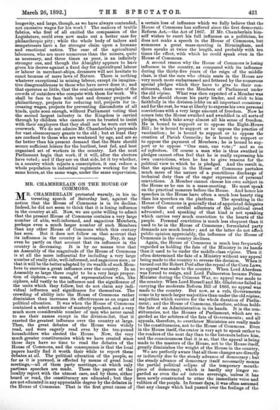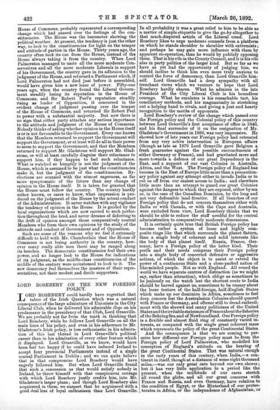MR. CHAMBERLAIN ON THE HOUSE OF COMMONS.
it/FR CHAMBERLAIN protested warmly, in his in- teresting speech of Saturday last, against the notion that the House of Commons is in its decline. Indeed, he did not seem to think that it is losing influence in the country at all. Now, we are quite willing to admit that the present House of Commons contains a very large number of able, well-informed, and sagacious Members, perhaps even a much larger number of such Members than any other House of Commons which this century has seen. But it does not follow on that account that its influence in the country is increasing. Nay, it may even be partly on that account that its influence in the country is decreasing. It is by no means true that an Assembly of the magnitude of the House of Commons is at all the more influential for including a very large number of really able, well-informed, and sagacious men ; or that it will be the better adapted by its wealth of such Mem- bers to exercise a great influence over the country. In an Assembly so large there ought to be a very large propor- tion of ciphers,—we mean, of representatives who, like ciphers, add vastly to the influence and the significance of the units which they follow, but do not claim any indi- vidual influence and significance for themselves. The crowding of ability into the House of Commons rather diminishes than increases its effectiveness as an organ of political education. It was when the House of Commons contained a select number of masterly speakers, and a very much more considerable number of men who never cared to see their names except in the division-list, that it exerted the greatest influence over the country at large. Then, the great debates of the House were widely read, and were eagerly read even by the ten-pound householders who elected the House. Now, the very much greater constituencies which we have created since those days have no time to read the debates of the House of Commons, and the consequence is that the local papers hardly find it worth their while to report these debates at all. The political education of the people, so far as it is pursued, is effected by means of great local meetings,—all of them party meetings,—at which only partisan speeches are made. These the papers of the locality report with the utmost care, and by these, either heard or read, the constituency are educated ; but they are not educated in any appreciable degree by the debates in the House of Commons. That is the first great cause of a certain loss of influence which we fully believe that the House of Commons has suffered since the first democratic Reform Act,—the Act of 1867. If Mr. Chamberlain him- self wishes to exert his full influence as a politician, he does not make a speech in the House of Commons, but summons a great mass-meeting in Birmingham, and there speaks at twice the length, and probably with ten times the effect, with which he could speak even in the House of Commons.
A second reason why the House of Commons is losing influence in the country, as compared with its influence during the thirty-five years of the reign of the middle class, is that the men who obtain seats in the House are very much more embarrassed and fettered by the numerous special pledges which they have to give to their con- stituents, than were the Members of Parliament under the old regime. What was then expected of a Member was that he should choose his party leader, and stick to him faithfully in the division-lobby on all important occasions ; and for the rest, he was at liberty to express his own personal convictions with a very large amount of freedom. Now he comes into the House swathed and swaddled in all sorts of pledges, which take away almost all his sense of freedom. He is bound to support or to oppose the Eight-Hours Bill ; he is bound to support or to oppose the practice of vaccination ; he is bound to support or to oppose the creation of Parish Councils ; he is bound to support or to oppose the payment of Members ; he is bound to sup- port or to oppose "One man, one vote ;" and so on ad infinitum. Of course a man who is thus swathed in pledges cannot often feel that he is really expressing his. own convictions, when he has to give reasons for the- political view to which he is pledged. And the result is,._ that the speaking in the House of Commons partakes much more of the nature of a punctilious discharge of technical duty than of the eager expression of personal' convictions. A Member cannot choose his own subject in the House as he can in a mass-meeting. He must speak on the practical measure before the House. And hence his speeches in the House have often a much less hearty ring than his speeches on the platform. The speaking in the House of Commons is generally that of appointed delegates rather than of cordial adherents of the political creed advocated ; and speaking of that kind is not speaking which carries very much conviction to the hearts of the people. Personal conviction is much less eloquent than it used to be in the House of Commons ; formulated party demands are much louder ; and as the latter do not affect public opinion appreciably, the influence of the House of Commons in the country declines.
Again, the House of Commons is much less frequently regarded as holding the fate of the Ministry in its hands than it used to be under the middle-class regime. Then it often determined the fate of a Ministry without any appeal being made to the country to reverse the decision. When it turned out Sir Robert Peel after the repeal of the Corn Laws, no appeal was made to the country. When Lord Aberdeen was forced to resign, and Lord Palmerston became Prime Minister during the Crimean War, no appeal was made to the country. When Lord Russell and Mr. Gladstone failed in carrying the moderate Reform Bill of 1866, no appeal was made to the country. But now, as a. rule, Governments come in by much larger majorities than under the old regime, majorities which survive for the whole duration of Parlia- ment ; and the House of Commons, therefore, seldom holds the fate of an Administration in its hands. It is the con- stituencies, not the Houses of Parliament, which are re- garded as the arbiters of the fate of Governments ; and all appeals, therefore, to overthrow Ministries are really made to the constituencies, not to the House of Commons. Even in the House itself, the orator is very apt to speak rather to the readers of the next day than to the listeners before him,. and the consciousness that it is so, that the appeal is being made to the masters of the House, not to the House itself, greatly diminishes the weight of the House in the country. We are perfectly aware that all these changes are directly or indirectly due to the steady advance of democracy ; but the steady advance of democracy itself necessarily means the partial political eclipse of the temporary mouth- piece of democracy, which is hardly any longer re- garded as even the ad interim sovereign, unless it has been newly constructed to utter the immediate voice and volition of the people. In former days, it was often assumed that any change which had passed over the feelings of the House of Commons, probably represented a corresponding change which had passed over the feelings of the con- stituencies. The House was the barometer showing the political weather. At present, the tendency is just the other way, to look to the constituencies for light on the temper and attitude of parties in the House. Thirty years ago, the country often took its cue from the House, instead of the House always taking it from the country. When Lord Palmerston managed to unite all the more moderate Con- servatives and all the more moderate Liberals in support of his Government, the country gave in its adhesion to the judgment of the House, and returned a Parliament which, if Lord Palmerston had not died just before it assembled, would have given him a new lease of power. Fifty-one years ago, when the country found the Liberal Govern- ment steadily losing its reputation in the House of Commons, and Sir Robert Peel's reputation steadily rising as leader of Opposition, it concurred in the evident change of judgment passing over the temper of the House of Commons, and returned Sir Robert Peel to power with a substantial majority. But now there is no sign that either party attaches any serious importance to the attitude and judgment of the House of Commons. Nobody thinks of asking whether opinion in the House itself is or is not favourable to the Government. Every one knows that the Members returned to support the Government will support the Government, or at least will do all in their power to seem to support the Government, and that the Members returned to support Mr. Gladstone will support Mr. Glad- stone, or will at least carefully disguise their reluctance to support him, if they happen to feel such reluctance. What is watched so hungrily is not the judgment of the House, which is assumed to be just what the constituencies make it, but the judgment of the constituencies. By- elections are scanned with the utmost eagerness, as far more symptomatic of the future than any change of opinion in the House itself. It is taken for granted that the House must follow the country. The country hardly either knows, or cares to know, what impression is pro- duced on the judgment of the House by the actual conduct of the Administration. It never watches with any vigilance the tendency of opinion in the House. It is guided by the local organisations which are now carried to such perfec- tion throughout the land, and never dreams of deferring to the drift of opinion amongst those comparatively neutral Members who form their own opinions by the study of the attitude and conduct of Government and of Opposition.
Such are some of the reasons why we feel it extremely difficult to hold with Mr. Chamberlain that the House of Commons is not losing authority in the country, how- ever many really able men there may be ranged along its benches. The democratic constituencies feel their own power, and no longer look to the House for indications of its judgment, as the middle-class constituencies of the middle of the century were accustomed to look to it. The new democracy feel themselves the masters of their repre- sentatives, not their modest and docile supporters.



































 Previous page
Previous page